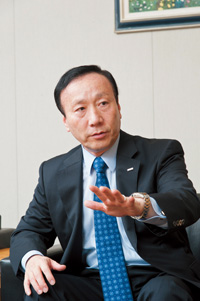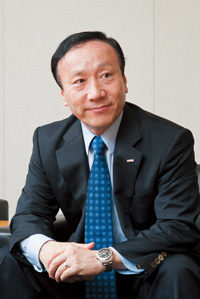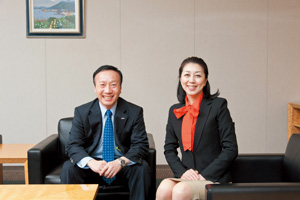 |
|
|
|
|
|
View from the Top Vol. 10, No. 12, pp. 1–5, Dec. 2012. https://doi.org/10.53829/ntr201212tp1  Creating New Value in the Spirit of "Speed and Challenge"OverviewCompetition in Japan's mobile communications market is becoming increasingly severe, fueled by the rapidly expanding sales of smartphones and the appearance of global players. In this environment, NTT DOCOMO must prove its worth as a leading company in the mobile communications business, and to do so, it is orchestrating all of its expertise and know-how to meet the increasingly diverse and advanced needs of its customers. In the aftermath of the Great East Japan Earthquake, we sat down with Kaoru Kato, President of NTT DOCOMO, to ask him about the role of mobile communications as a major lifeline for society, recognizing his experience in spearheading restoration measures at many disaster sites. Facing the future without a moment to lose––Mr. Kato, congratulations on your appointment as President of NTT DOCOMO. To begin with, could you tell us something about your guiding principles and management policies? Well, since starting my career at NTT, I have been involved in the planning and development of mobile communications systems and mobile phones. I have witnessed the evolution of mobile communications and mobile phones from the early days of the industry and have confronted a wide variety of issues over the years. The business environment of today is undergoing great change, but we are making an all-out effort to apply the knowledge that we have accumulated and the collaborative ties that we have formed both inside and outside the company in order to achieve a management style that can respond swiftly to change. Keeping the above spirit in mind and adhering to the policies of my predecessor, I have proposed the spirit of “Speed and Challenge.” When taking up a new post, some people become rather tense, thinking that they must do something different from their predecessor. Although that could also have been the case with me, I intend to respect the ideas of the former president in carrying out the company’s management vision, especially since I worked with him on various issues over the years. As you know, the mobile communications market is changing at an unprecedented speed and so are customer needs. To respond to such an unpredictable environment, I would like to take up new challenges, knowing that we have not a moment to lose. To this end, we are implementing the following two initiatives at NTT DOCOMO: “evolution of services by pursuing innovation” and “new value creation through convergence.” Making smart life a realityThe first initiative “evolution of services by pursuing innovation” means creating new services that link smartphones with the “DOCOMO cloud”. Let me take Photo Collection as an example of the services offered through the cloud. This is a storage service that enables the user to store up to 5 GB of photos and video clips free of charge in the personal cloud. Photos and videos taken with a smartphone or other devices or stored on a personal computer can be automatically uploaded to the cloud and then viewed from a smartphone, personal computer, tablet or other device as desired. The Photo Collection service can be linked with the organizing function on the cloud, which is capable of identifying faces and scenes and automatically grouping those photos and videos according to certain categories such as date, person, event, place, model, and service. The service can also be linked with external services such as Evernote, Eye-Fi, and HighCam for enhanced storage, viewing, and organization of photos and videos. In addition, we are enhancing the functions of Shabette-Concier, a voice-agent app, Mail-Hon’yaku Concier, an app for translating text messages, and Hanashite Hon’yaku, a speech translation app. We are also starting to provide the docomo mail and docomo phonebook services to expand to a full lineup of cloud-linked apps (software applications). Shabette-Concier now gives more accurate replies by linking with i-concier, another DOCOMO service. Mail Hon’yaku Concier translates text messages composed by the user on their smartphone into the other party’s language in the cloud. This app, which currently supports Japanese-to-English & English-to-Japanese, Japanese-to-Korean & Korean-to-Japanese, and Japanese-to-Chinese & Chinese-to-Japanese, can be used for text-based communications as in email and social networking services (SNSs). We take pride in this app because it helps the user to send messages in a foreign language and facilitates their communication with people who speak other languages. Finally, the docomo mail and docomo phonebook services store the user’s email and phonebook data in the cloud, thereby enabling the user to access the data from multiple devices and to recover the data if necessary. These services are making the user’s life safer, smarter and more convenient. Evolving the mobile phone into a convenience store in your hand“New value creation through convergence,” the second of our new initiatives, means merging the smartphone with various areas involving the lives and lifestyles of people. The smartphone, which can fit into your hand, encapsulates the performance of a supercomputer of just a few decades ago. Despite its small size, it incorporates functions for enjoying music, TV, movies, and books and for assisting the user in fields such as shopping, health, and medical care. For how long are we separated from our mobile phones during the course of a day? We only have to think about our daily life to answer this question. The fact is that the mobile phone is a device that most users have near at hand at all times as a means of receiving a wide array of services and products. It is becoming, in a sense, a convenience store in your hand. We are accelerating the realization of this vision through our dshopping service, which enables users to safely and conveniently purchase products that are carefully screened by NTT DOCOMO. We are also committed to forming alliances with other enterprises to further enhance mobile shopping. Our aim here is to provide our customers with total shopping support. To implement these two initiatives rapidly, we need to reform our corporate structure and revise our business processes to keep up with the times. Measures must also be taken to make organizational changes and enhance personnel training.
Mission and dream arising from personal experience of the Japan Airlines plane crashIt is my belief that NTT DOCOMO is a company with a mission to provide its customers with safe and secure services and with a dream to enhance and enrich the lives of its customers through highly convenient products. This is why I want to create a workplace in which each and every employee can eagerly and enjoyably take on new challenges. At the same time, I want to be someone who my subordinates can easily talk to and feel relaxed around. In particular, I want to be a person to whom anyone can say anything, even if it concerns difficult situations or bad news. I don’t mind standing and talking if I can hear about problems while they are still in the budding stage. ––From what experiences did this mission and dream arise? This dream to enhance and enrich the lives of our customers through highly convenient products has come about in various ways: from my past involvement in the planning and development of mobile communications and mobile phones, from my expectations for further evolution and progress of mobile systems and products, and from my wish to provide customers with convenient products and thrilling experiences above and beyond anything that they have ever seen before. Of course, I realize that NTT DOCOMO is entering a very difficult period in our business history, but I also know that there is much satisfaction to be gained from doing work that has great potential for enriching people’s lives. Though it would be hard to explain the evolution of our perception of our mission in just a few words, let me say that my past work at actual disaster sites has had a big influence. In 1985, a Japan Airlines plane crashed into Mount Osutaka in Gunma Prefecture. I was told to head for the crash site with several mobile phones. Unlike today’s lightweight models, each of these weighed about one kilogram and had a shoulder strap. I pushed my way up steep mountain paths and eventually arrived at the crash site. It was a horrible scene that I can hardly put into words. The only means of communications at the site was through radio equipment, and it took some time to establish communications even with the incident command center, but the mobile phones that I brought with me greatly improved communications between the crash site and the command center. As a result, I became more confident about the usefulness of mobile phones. Last year’s Great East Japan Earthquake underscored our role as a communications operator to connect at all times: during emergencies so that people can check on their loved ones and at normal times so that people can simply communicate with each other. Our mission to connect people is something that we should never forget.
DOCOMO is the closest to customers among all NTT Group companies––Could you say a few words to NTT DOCOMO employees? Certainly. First, I would emphasize that NTT DOCOMO must transform itself into an integrated service company. Continuing to focus our efforts only on the mobile communications business as we have been doing so far can only lower our corporate value. I would like all of us at NTT DOCOMO to be fearless and energetic in creating new value and markets. Here, I would reiterate that communication devices are first and foremost tools, and to enable them to be used to their full extent, it is important that we listen closely to the people using them, namely, our customers. The role of docomo shops and NTT DOCOMO information centers is not just to sell mobile phones and network services: they are also places where customers can talk freely to us about their needs. Of course, there are times when it is technically difficult to satisfy customer wishes, and requests related to service quality can sometimes be quite demanding. Nevertheless, I truly believe that making an effort to satisfy each and every customer request leads to a beneficial cycle in which the services that we provide are continuously enhanced and expanded and the mobile devices that we offer have increasingly higher levels of performance. This endeavor is not limited to projects and activities at NTT DOCOMO headquarters: to become a truly integrated service company, headquarters and all company offices and retail sites in the field must move forward as one. My aim is to visit NTT DOCOMO offices and retail sites throughout the country to listen to the ideas and opinions of those who deal directly with our customers and to bring their voices back to headquarters. Let’s bring about a true revolution for the company by working in a unified manner wherever you are: at headquarters, regional offices, or retail sites. Furthermore, NTT DOCOMO is closest to customers among companies in the NTT Group in the sense that we provide communications over the mobile phone—an item that people keep close at hand day in and day out. We are therefore in a most effective position to listen to customer needs and to convey to customers the services and plans of the entire NTT Group. In short, I want us to be a company that is truly welcoming and hospitable to our customers while cooperating and collaborating with other NTT Group companies. Let’s explore new worlds in the spirit of “ONE docomo”! Facing R&D with a “70% is OK” mindset while learning from our customers––Mr. Kato, could you also leave us with a message to everyone in the R&D department? Yes, I would tell our research and development (R&D) personnel to place importance on speed and to pursue R&D in the spirit that even 70% is OK. I think that the NTT Group and the R&D department tend to have the idea that products must be perfect. Although this is undeniably a noble aspiration, we must make a decision about product or service development at some point in time even before perfection has been reached in order to keep up with the rapidly changing market. I hesitate to say this, but seeking total perfection often makes you lose your sense of time. Services and products that customers desire should be provided as quickly as possible and anything in those services or products that turns out to be inadequate should then be corrected immediately. In short, I would like our R&D personnel to adopt the attitude of “if it’s done wrong, it’s OK to make a course correction and then, redo it” in their work. In this regard, our customers can assist in making a service even better by giving us feedback. I believe that success comes after accumulating many failures. It is not necessary to be 100% successful all the time. What is needed is the ability to ascertain what is of true value, what is truly needed. Of course, it might be difficult to tell whether what you have at a certain point in time is 70% of what you need, but I will continue to talk about the need for this “70% is OK” attitude until it becomes embedded in R&D. A top manager once said to me: “If people say that you are saying the same thing again and again, you can be sure that your words have finally penetrated their minds.” Fortunately, there have been more opportunities for me to talk with leaders in various fields since I became president. From here on, I would like to share with R&D personnel and other NTT DOCOMO employees some of the wise advice of those leaders who have overcome many difficult situations as well as the words of wisdom that support my ideas and outlook. Last but not least, my personal motto is “good can come out of misfortune.” Good and bad times are the way of the world. Since I entered NTT, it certainly has not been smooth sailing all the time, and I cannot say that I have always been highly motivated. Actually, when I was in charge of achieving a practical in-flight telephone service, I had to conduct a very strict airworthiness test that had to be passed. By making an extreme effort, I was successful in completing this test in what seemed to be an impossibly short time. This success revealed to me how hardship and pain are sometimes necessary to get things done. Even today, I have a vivid memory of those tough times. Difficult and painful situations can sometimes lead to good results. Furthermore, while there are only a limited number of things that a person can complete on his or her own, there are many things that can be achieved by seeking the cooperation of people around you. Something that has been achieved through much hardship necessarily becomes a valuable possession of the people involved. Let’s move forward together without losing heart!
Interviewee profileCareer highlightsKaoru Kato started his career at Nippon Telegraph and Telephone Public Corporation (now NTT) in 1977. He has been involved in the mobile phone business since the early days of the industry. He served as Executive Vice President and Member of the Board of Directors and Managing Director of the Corporate Strategy & Planning Department at NTT DOCOMO Kansai, Inc. beginning in 2007 and as Executive Vice President and Member of the Board of Directors and Managing Director of the Corporate Strategy & Planning Department at NTT DOCOMO from 2008. He assumed his current position in June 2012. |
|











